Back from the Road Trip
Just got back from a neat loop trip around the eastern/central part of the country. We woke up at 5 to head to Tororo at 6, we being me, Shereen (new U of O med student who got here the night before) Grant, Phil, Heidi, and Sarah (the last four are all senior researchers working together/individually on research projects here in uganda).
Tororo is a region right next to the Kenyan border, on the east side of Uganda, and the CDC runs a huge study over there, where they have a bunch of people enrolled in a HIV study, and they drive massive distances every week on a fleet of motorcycles to each individual's house, and interview them/give them medication. It's a huge project, and very cool. We got a tour of their impressively high-tech facilities (their lab is on par with the lab we have here in Kampala pretty much, and their data center is much larger and has a ton of staff, making data entry easy for them to do, even with double-entering the data, a quality control check we don't have the manpower to do yet). We even went on a home visit (we drove our separate cars of course, but it would have been neat to have gone on one of the motorcycle fleet- haven't ridden one myself in a while).
Motorcycle Fleet:
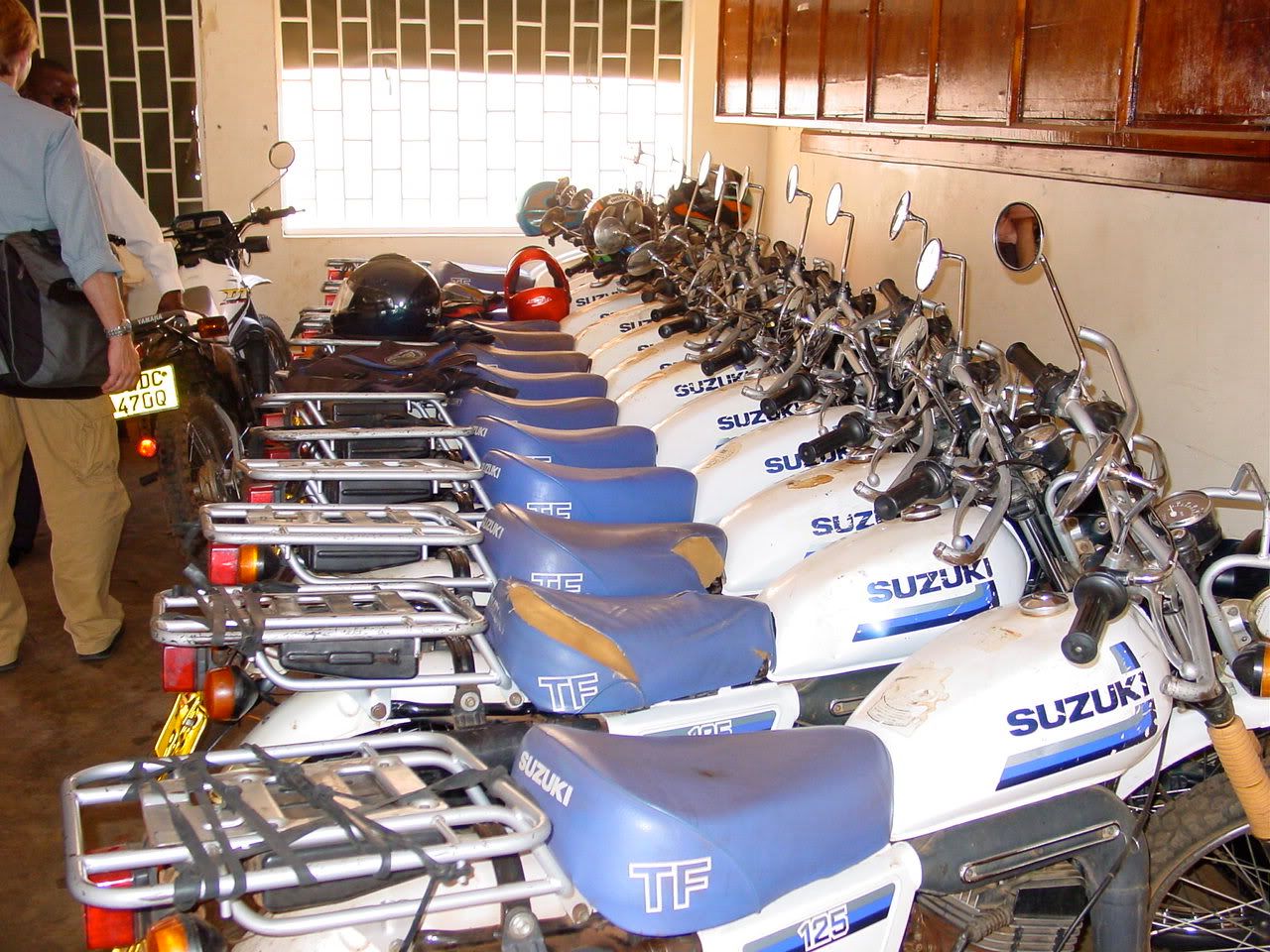
Home Visit:
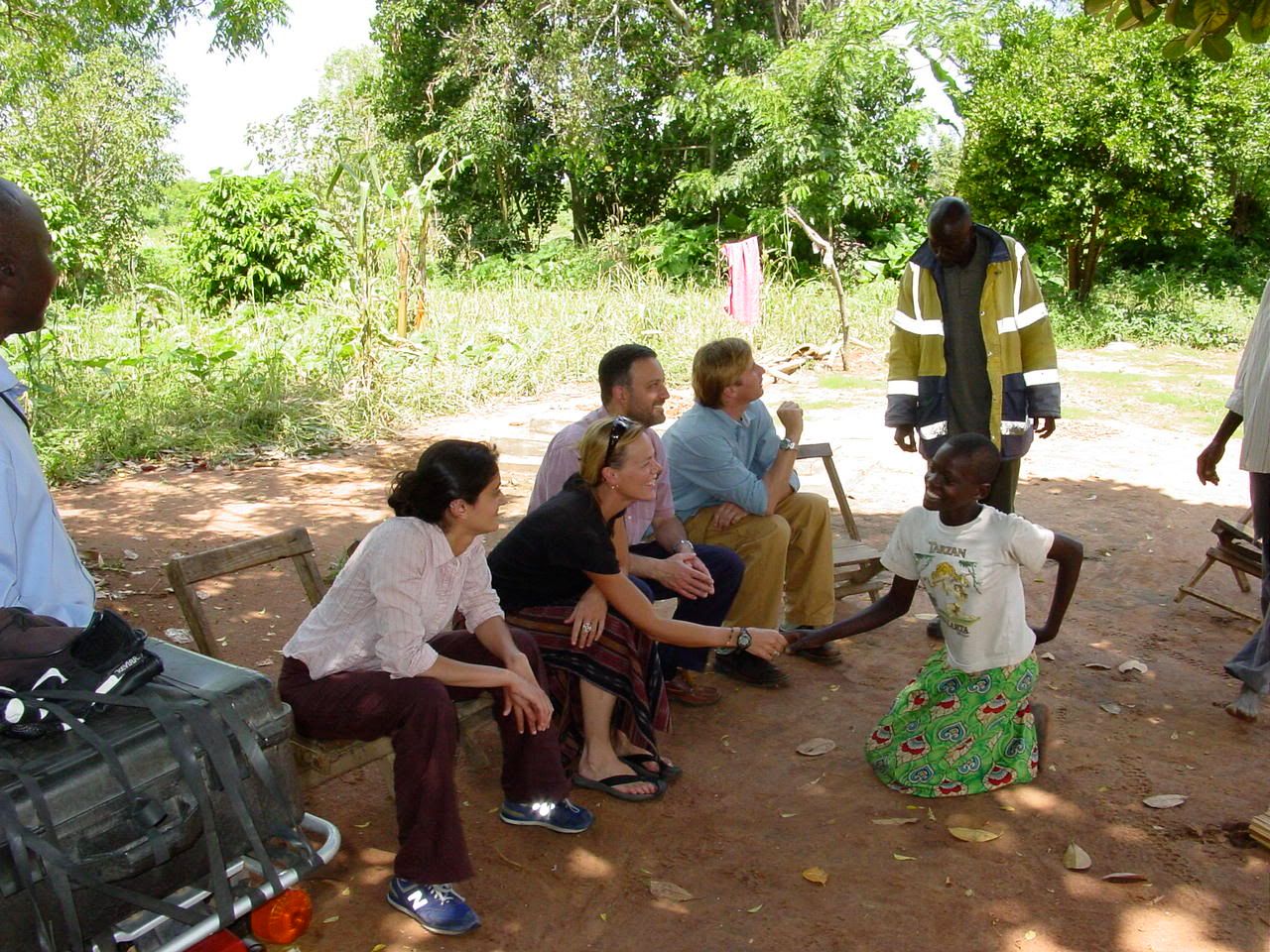
The CDC motorcycle guys are highly motivated and do a good job of getting all the data that they can, and it's a very neat setup, albeit really really expensive to do.
After seeing Tororo, we went to a clinic that was the equivalent of the one in Apac, that we were thinking of potentially setting up another efficacy/surveillance project at. It was at this place that we met this chicken:
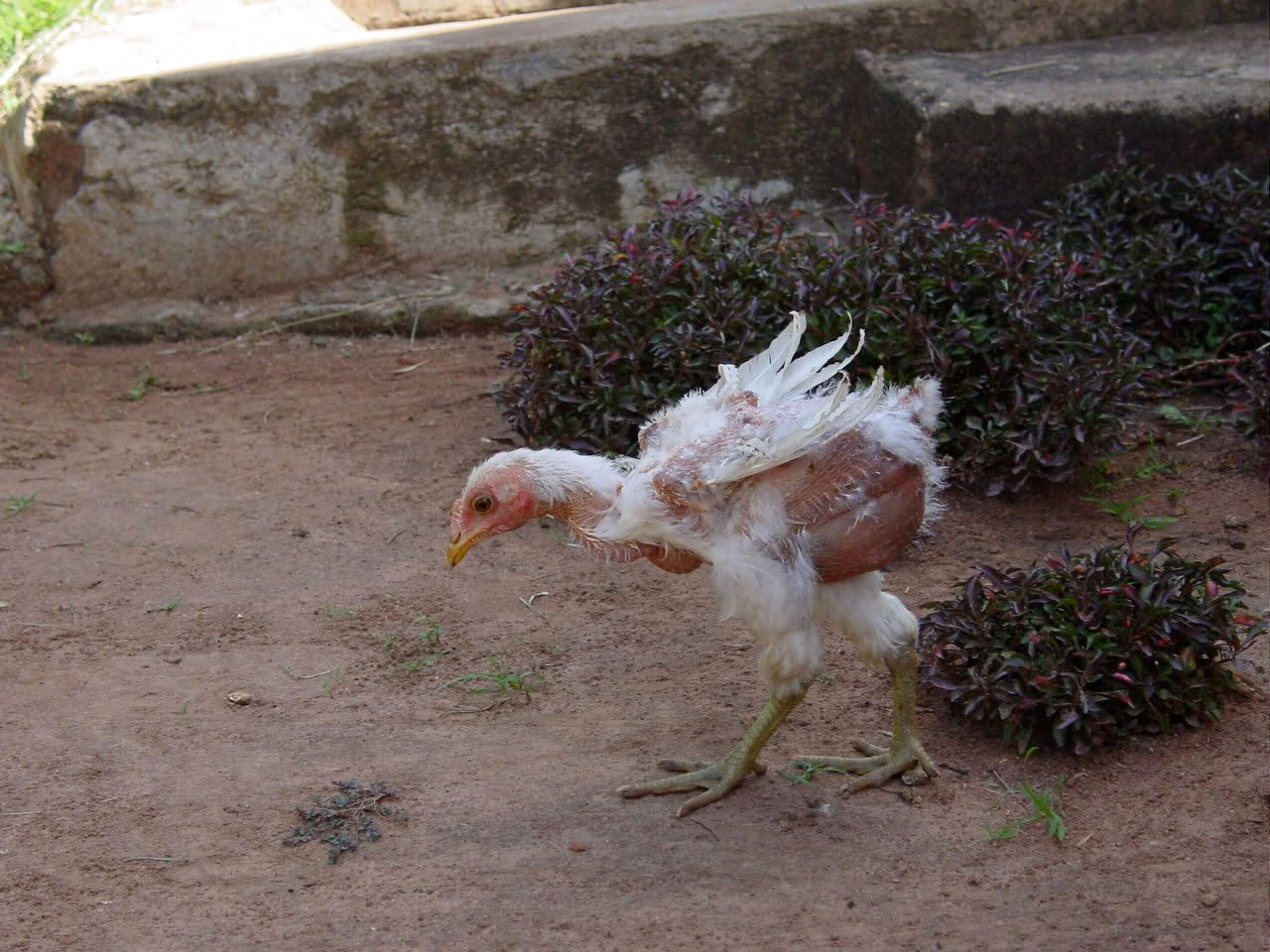
For the vets that read this blog, maybe you can tell me what the chicken is suffering from... seems pretty interesting. One of our group commented that chickens suffering from bird flu tend to shed their feathers... needless to say, we didn't go petting the chicken.
Sarah split up with us after that and headed to Jinja, while the rest of us started driving to Apac. After spending the night in one of the towns halfway between Tororo and Apac (we ran into a World Bank meeting there, complete with lots of armed guards- they had their conference at the hotel we planned to stay at), we continued on in the morning to Apac and got there around 11. Here is a picture of the registration desk, which is insanely full at 6 am, and is still quite busy even at 11.
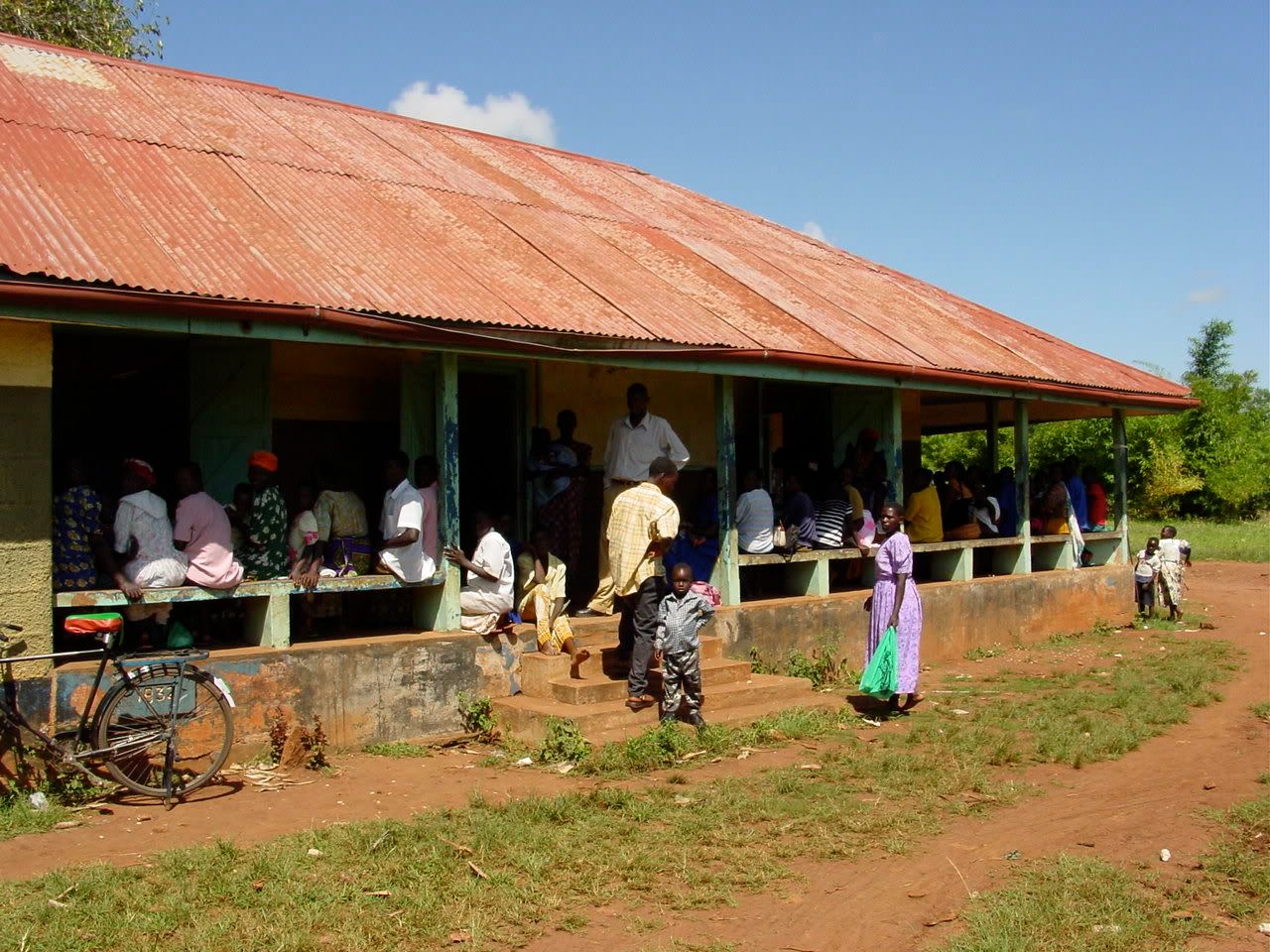
Dr. Yeka from the drug efficacy study had just arrived before us, and we heard from his group and Nuhu that the Nile ferry had run out of fuel, and would not be running that day! This made it important that we leave earlier and go back to Kampala by a different route, thus making our departure time 2 pm.
Shereen and I spent the time walking around the facility and taking photographs of the log books- it's a new idea, and we hope it will cut down on any data entry errors (photocopies cut the log books into several pages that were hard to put back together accurately). After this, we had a meeting with most/all of the staff at Apac, and Grant gave a good talk to them about the importance of the surveillance project. His key points were that 1) the surveillance project is a bridge of sorts between the clinic in Apac and the Ministry of Health in Kampala 2) that collecting good accurate data on malaria is important, because the Ministry of Health needs to distribute resources all over the country- if they see that Apac has the most malaria, then it makes sense that the Ministry should give more aid and supplies to Apac 3) The surveillance program itself can't give extra funds/pay for the extra work done- the extra work is part of the job, and should be done, but there are perks that can be had, including all-expense paid training programs for the clinical officers and lab techicians, feedback reports on how the clinic is doing with its surveillance, continued visits and attention from the UCSF group and by extension the Ministry of Health, and certain supplies that get provided in the course of various studies (ie chairs and tables and other infrastructure stuff). After giving the "carrot" Grant followed it with the "stick" by stating that if the surveillance data had lots of holes, and that there was missing data for more than 20% of the observations consistently, then the project was going to be a waste of time and resources, and that we would have to leave and do the surveillance project elsewhere- our data from the previous months had been good (one month had close to 95% complete records) but in the past few weeks, the record keeping had slipped a ton, and looked more like 60-70% at best, and some pages were almost completely blank. The workers there all seemed to understand the situation well and want to do well, so we hope that the results will be good.
After the meeting, we left to head back to Kampala by way of Lira then a bridge over the Nile. This is where the scariest part of the trip happened. The area is beautiful, and big baboons are all over the road there, and the Nile is a series of awesome rapids that would make a kayaker very very happy. Heidi took this route often on matatus, and since we were actually driving it, we decided to take the opportunity to stop and look at the Nile, the trees, the rapids, and take a few pictures... which ended being a bad idea. While I was taking photos, a soldier came out of the bushes under the bridge, and started yelling at me to stop taking pictures, asked where did I get my permission from, asking for documents, then said "you are under arrest" which needless to say, freaked me out- I was just stunned and couldn't say anything for a while, and the rest of my group came up and we started talking with the soldier. Heidi tried to speak to him in one of the native tongues, but he only spoke English and Swahili, and another armed guard came up (both of them had automatic rifles...). I ended up deleting all the photos of the Nile, and it seems that they were really agitated that we took photos of the bridge at all, I guess because bridges are military structures and they don't want pictures taken of the bridges the same way that the US doesn't like people takinig pictures of the Stealth bombers and fighters and their engine structures... We had to pull rank by saying we were associated with the Ministry of Health, and that the photos on the camera were for the Ministry, and that we couldn't give him the camera, and finally we got away, but it was definitely pretty scary for a while. I suppose I've been arrested and released technically- wonder if it will go on a rap sheet somewhere.
My only picture of the Nile:
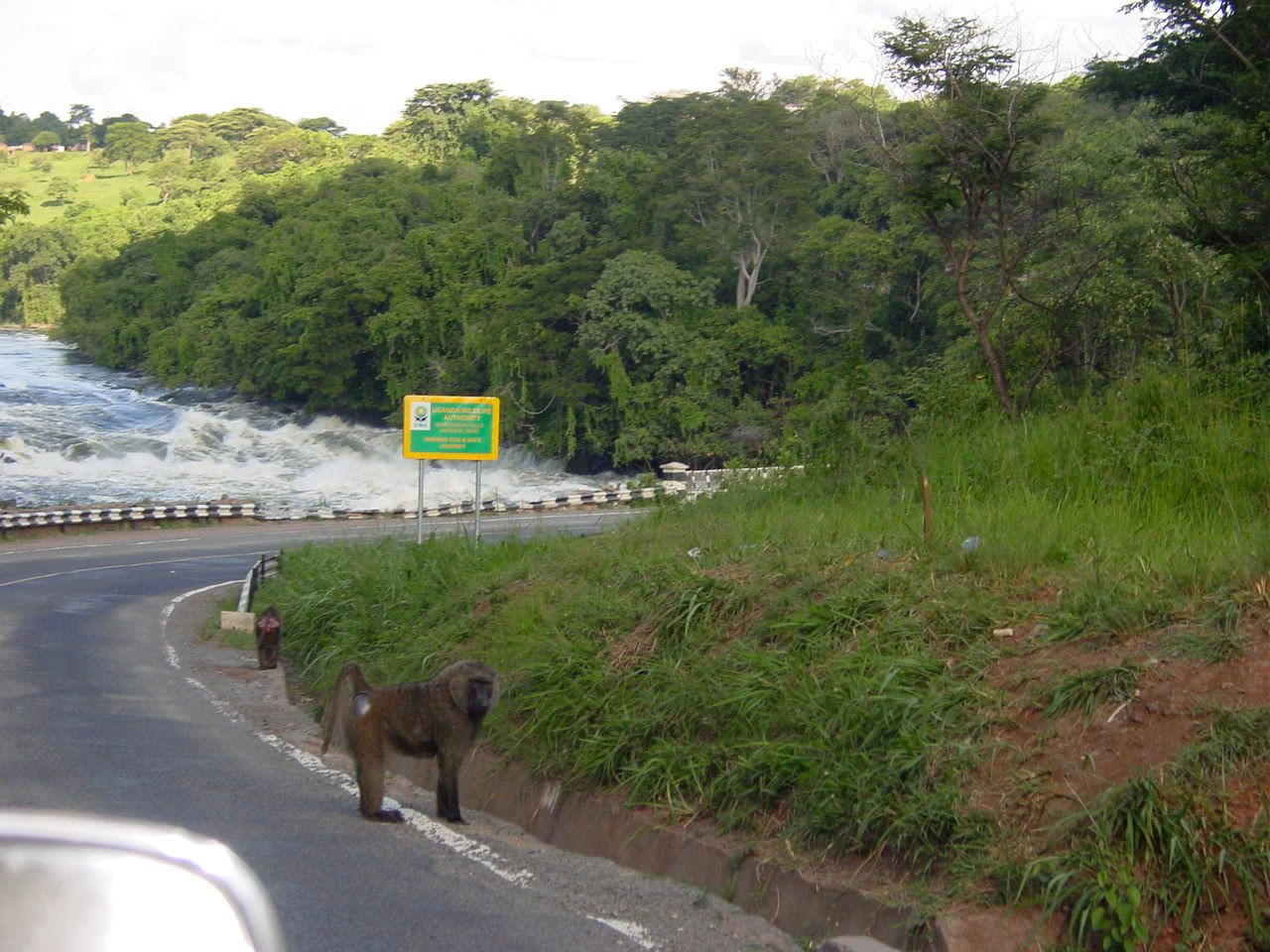
Another baboon:
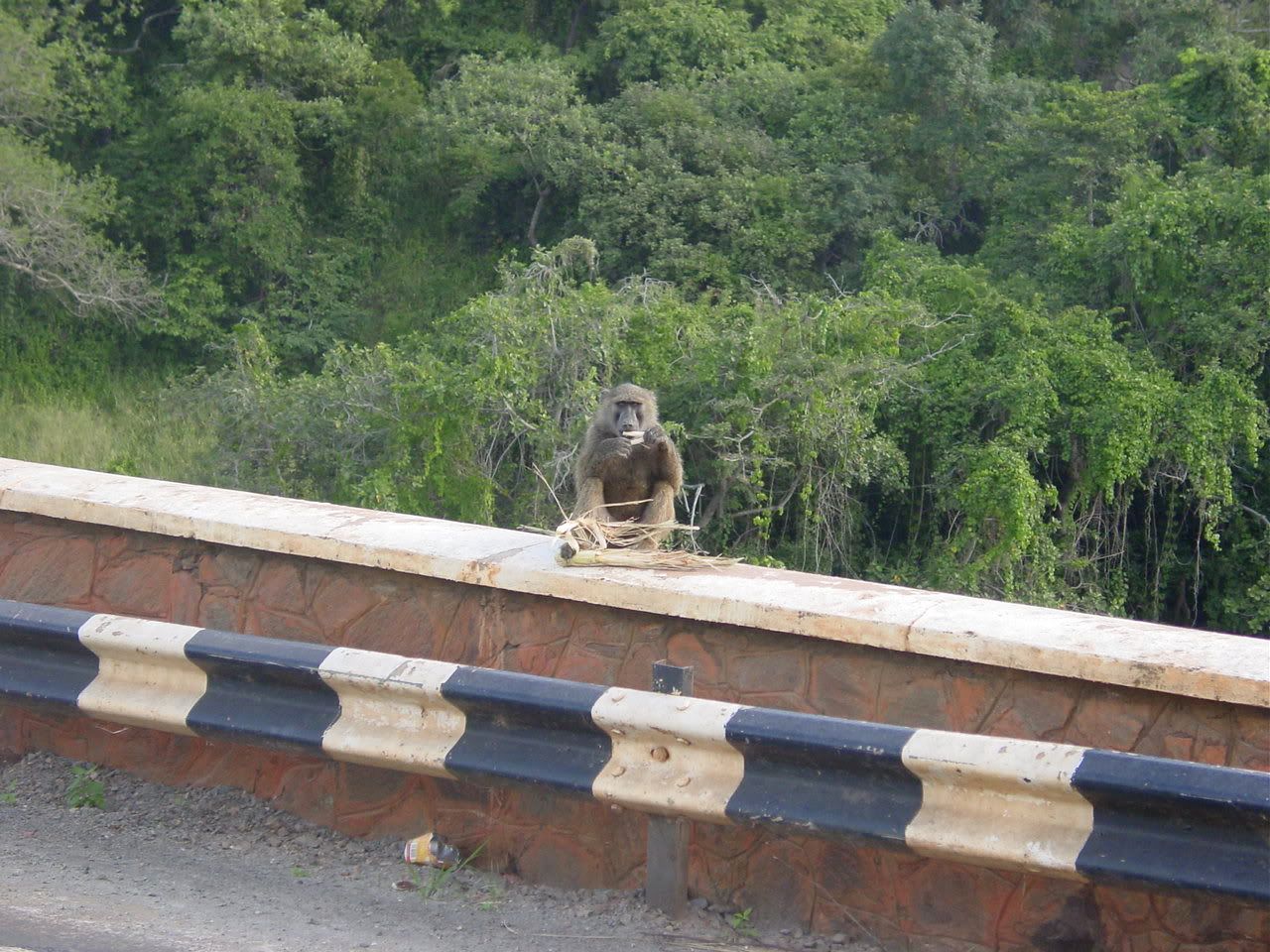
We joked that I could blame it on my look alike- apparently at Cirrote, the town we stayed at the night before, there was a guy who "looked like me" who ate dinner and didn't pay for it at the hotel- which surprised all of us because the chances of a Chinese guy being at the hotel who looked like me (we were really far from anything well developed) we thought was close to zero percent... I suppose stranger things have happened.
Some definite good things came up on the trip- I had a good long talk with Phil about research and what I want to do. We broke it down into two big categories- academic research and public health, with one being grants and funding and publishing and research studies while the other encompassed outbreak investigation and salaried position and more applied health. I don't think that the competitive world of grants and publishing is really for me, and I feel a much stronger pull towards public health departments and working for places like the CDC, but the problem is that you can't really write a thesis on applied public health that easily. The one thing that does make a lot of sense, with my molecular bio background, is doing some molecular epi on malaria- and molecular epi does have good use in outbreaks and public health application (albeit slower than you'd like, what with PCR and culturing and lab work and all). I think I've come to the conclusion that a molecular epi thesis will be good for my PhD, then following it up with some EIS work for the CDC and then applied public health would be a good move- we'll see what Art thinks when he comes. Apparently we have a malaria symposium that's happening Monday and Tuesday of this coming week, but Art is coming a bit too late for the symposium, so it seems like he'll just be here to hang out and visit people and see how I'm doing- I'll hopefully have some good long talks with him about this stuff, and about funding for the coming years...
Tororo is a region right next to the Kenyan border, on the east side of Uganda, and the CDC runs a huge study over there, where they have a bunch of people enrolled in a HIV study, and they drive massive distances every week on a fleet of motorcycles to each individual's house, and interview them/give them medication. It's a huge project, and very cool. We got a tour of their impressively high-tech facilities (their lab is on par with the lab we have here in Kampala pretty much, and their data center is much larger and has a ton of staff, making data entry easy for them to do, even with double-entering the data, a quality control check we don't have the manpower to do yet). We even went on a home visit (we drove our separate cars of course, but it would have been neat to have gone on one of the motorcycle fleet- haven't ridden one myself in a while).
Motorcycle Fleet:

Home Visit:

The CDC motorcycle guys are highly motivated and do a good job of getting all the data that they can, and it's a very neat setup, albeit really really expensive to do.
After seeing Tororo, we went to a clinic that was the equivalent of the one in Apac, that we were thinking of potentially setting up another efficacy/surveillance project at. It was at this place that we met this chicken:

For the vets that read this blog, maybe you can tell me what the chicken is suffering from... seems pretty interesting. One of our group commented that chickens suffering from bird flu tend to shed their feathers... needless to say, we didn't go petting the chicken.
Sarah split up with us after that and headed to Jinja, while the rest of us started driving to Apac. After spending the night in one of the towns halfway between Tororo and Apac (we ran into a World Bank meeting there, complete with lots of armed guards- they had their conference at the hotel we planned to stay at), we continued on in the morning to Apac and got there around 11. Here is a picture of the registration desk, which is insanely full at 6 am, and is still quite busy even at 11.

Dr. Yeka from the drug efficacy study had just arrived before us, and we heard from his group and Nuhu that the Nile ferry had run out of fuel, and would not be running that day! This made it important that we leave earlier and go back to Kampala by a different route, thus making our departure time 2 pm.
Shereen and I spent the time walking around the facility and taking photographs of the log books- it's a new idea, and we hope it will cut down on any data entry errors (photocopies cut the log books into several pages that were hard to put back together accurately). After this, we had a meeting with most/all of the staff at Apac, and Grant gave a good talk to them about the importance of the surveillance project. His key points were that 1) the surveillance project is a bridge of sorts between the clinic in Apac and the Ministry of Health in Kampala 2) that collecting good accurate data on malaria is important, because the Ministry of Health needs to distribute resources all over the country- if they see that Apac has the most malaria, then it makes sense that the Ministry should give more aid and supplies to Apac 3) The surveillance program itself can't give extra funds/pay for the extra work done- the extra work is part of the job, and should be done, but there are perks that can be had, including all-expense paid training programs for the clinical officers and lab techicians, feedback reports on how the clinic is doing with its surveillance, continued visits and attention from the UCSF group and by extension the Ministry of Health, and certain supplies that get provided in the course of various studies (ie chairs and tables and other infrastructure stuff). After giving the "carrot" Grant followed it with the "stick" by stating that if the surveillance data had lots of holes, and that there was missing data for more than 20% of the observations consistently, then the project was going to be a waste of time and resources, and that we would have to leave and do the surveillance project elsewhere- our data from the previous months had been good (one month had close to 95% complete records) but in the past few weeks, the record keeping had slipped a ton, and looked more like 60-70% at best, and some pages were almost completely blank. The workers there all seemed to understand the situation well and want to do well, so we hope that the results will be good.
After the meeting, we left to head back to Kampala by way of Lira then a bridge over the Nile. This is where the scariest part of the trip happened. The area is beautiful, and big baboons are all over the road there, and the Nile is a series of awesome rapids that would make a kayaker very very happy. Heidi took this route often on matatus, and since we were actually driving it, we decided to take the opportunity to stop and look at the Nile, the trees, the rapids, and take a few pictures... which ended being a bad idea. While I was taking photos, a soldier came out of the bushes under the bridge, and started yelling at me to stop taking pictures, asked where did I get my permission from, asking for documents, then said "you are under arrest" which needless to say, freaked me out- I was just stunned and couldn't say anything for a while, and the rest of my group came up and we started talking with the soldier. Heidi tried to speak to him in one of the native tongues, but he only spoke English and Swahili, and another armed guard came up (both of them had automatic rifles...). I ended up deleting all the photos of the Nile, and it seems that they were really agitated that we took photos of the bridge at all, I guess because bridges are military structures and they don't want pictures taken of the bridges the same way that the US doesn't like people takinig pictures of the Stealth bombers and fighters and their engine structures... We had to pull rank by saying we were associated with the Ministry of Health, and that the photos on the camera were for the Ministry, and that we couldn't give him the camera, and finally we got away, but it was definitely pretty scary for a while. I suppose I've been arrested and released technically- wonder if it will go on a rap sheet somewhere.
My only picture of the Nile:

Another baboon:

We joked that I could blame it on my look alike- apparently at Cirrote, the town we stayed at the night before, there was a guy who "looked like me" who ate dinner and didn't pay for it at the hotel- which surprised all of us because the chances of a Chinese guy being at the hotel who looked like me (we were really far from anything well developed) we thought was close to zero percent... I suppose stranger things have happened.
Some definite good things came up on the trip- I had a good long talk with Phil about research and what I want to do. We broke it down into two big categories- academic research and public health, with one being grants and funding and publishing and research studies while the other encompassed outbreak investigation and salaried position and more applied health. I don't think that the competitive world of grants and publishing is really for me, and I feel a much stronger pull towards public health departments and working for places like the CDC, but the problem is that you can't really write a thesis on applied public health that easily. The one thing that does make a lot of sense, with my molecular bio background, is doing some molecular epi on malaria- and molecular epi does have good use in outbreaks and public health application (albeit slower than you'd like, what with PCR and culturing and lab work and all). I think I've come to the conclusion that a molecular epi thesis will be good for my PhD, then following it up with some EIS work for the CDC and then applied public health would be a good move- we'll see what Art thinks when he comes. Apparently we have a malaria symposium that's happening Monday and Tuesday of this coming week, but Art is coming a bit too late for the symposium, so it seems like he'll just be here to hang out and visit people and see how I'm doing- I'll hopefully have some good long talks with him about this stuff, and about funding for the coming years...

0 Comments:
Post a Comment
<< Home